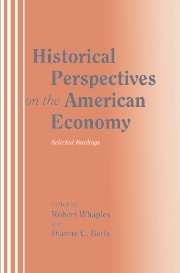Book contents
- Frontmatter
- Contents
- Acknowledgments
- Introduction to students
- Introduction to instructors
- Contributors
- I Introduction
- II Colonial and early national economy
- III Slavery and servitude
- IV The South since the Civil War
- V The rise of American industrial might
- VI Populism
- VII Women in the economy
- VIII The Great Depression
- Appendix: Basics of regression
- Glossary
- Name index
- Subject index
II - Colonial and early national economy
Published online by Cambridge University Press: 05 June 2012
- Frontmatter
- Contents
- Acknowledgments
- Introduction to students
- Introduction to instructors
- Contributors
- I Introduction
- II Colonial and early national economy
- III Slavery and servitude
- IV The South since the Civil War
- V The rise of American industrial might
- VI Populism
- VII Women in the economy
- VIII The Great Depression
- Appendix: Basics of regression
- Glossary
- Name index
- Subject index
Summary
“An economic interpretation of the American Revolution”
by Marc Egnal and Joseph A. ErnstAlthough “An Economic Interpretation of the American Revolution” was written over two decades ago, it remains “the best starting point for historians interested in the role of the economy in the Revolution” (McCusker and Menard, 352). The essay concerns questions of profound importance to historians of all types. What role did economic forces play in the founding of this country? Or, more broadly, how did the American economy and American society become the way they are today? Our history matters. And this was a critical episode.
The essay is an excellent example of how historians convince one another. It opens with a review of the historiographical debate between Whig and Progressive historians. Marc Egnal and Joseph Ernst must recapitulate the ideas that have come before theirs, because there is no consensus on this subject and so that their original contributions can be highlighted and put in context. The historiography is also necessary to show the weaknesses of earlier theories, to understand better what needs patching up. In addition, the historiography reminds us of the complexity of the roots of the Revolution. The authors stress that there is no monocausal explanation, and they implicitly recognize that theirs will not be the final word. Notice that the article is titled “an” economic interpretation, not “the” economic interpretation.
- Type
- Chapter
- Information
- Historical Perspectives on the American EconomySelected Readings, pp. 39 - 41Publisher: Cambridge University PressPrint publication year: 1995



